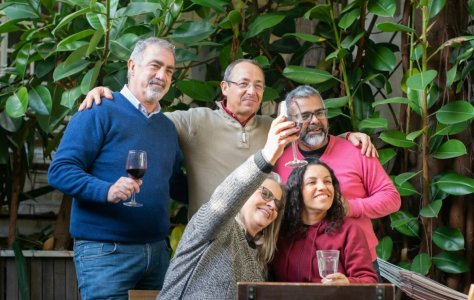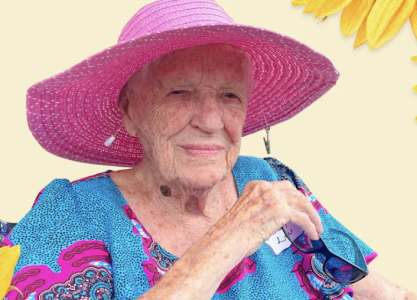A centenarian’s simple secret for making new friends at any age
By
Veronica E.
- Replies 0
Have you ever wished it were easier to meet new people and form lasting friendships?
Many older adults feel this way, especially after retirement or life changes that shift daily routines.
Building connections can feel intimidating, but the truth is, it doesn’t have to be.
In fact, one remarkable centenarian, Mary Lou Mayo, has shared a simple strategy that’s worked for them over the course of a century—and it’s backed by research.
Their message is clear: friendship isn’t limited by age, it’s fueled by curiosity, kindness, and a willingness to take that first step.

When asked how they’ve kept expanding their circle of friends well into their 100s, this centenarian’s advice was refreshingly straightforward: “Be curious about people. Ask questions. Listen more than you talk.”
While simple, it’s a timeless formula that turns strangers into companions.
Research shows that showing genuine interest in others increases the likelihood of forming meaningful, lasting bonds.
It’s true that making friends as adults can feel different than it did in childhood or early adulthood.
Work, family obligations, and the natural drift of time often make it harder to maintain or grow social circles.
Retirement, relocations, or the loss of loved ones can deepen those feelings of loneliness.
But studies confirm that older adults with strong social ties not only enjoy better moods but also live longer, healthier lives.
The key is giving yourself permission to try again, no matter your age.
This centenarian’s advice breaks down into practical steps:

While handwritten letters and face-to-face chats worked well in the past, today’s technology offers even more options.
Facebook groups, video calls, and local Meetup events can help you stay connected or discover new friends.
Libraries, senior centers, and volunteer opportunities also remain excellent in-person avenues.
And sometimes, the simplest step—reaching out to an old friend—can revive a cherished bond.
Friendships aren’t just nice to have—they’re good for your health.
Studies from Harvard and the Mayo Clinic show that social engagement boosts immunity, reduces the risk of heart disease, sharpens the mind, and can even extend lifespan.
On the flip side, the CDC warns that loneliness and isolation raise the risk of dementia and other health issues.
Staying connected is truly part of staying well.
Friendship doesn’t belong to any one age group—it’s something we can create and enjoy throughout our lives.
Whether you start by asking a thoughtful question, joining a new activity, or simply saying hello to a neighbor, the smallest step can spark something meaningful.
As our centenarian friend reminds us: “Everyone has a story worth hearing. All you have to do is ask.”
Read next: Is your stress affecting your pet? Discover how your anxiety can impact your furry friend and how to help them stay calm

At The GrayVine, we know our readers hold a wealth of wisdom and stories worth sharing. Have you made a new friend recently, or do you have a favorite way of starting conversations? Your ideas could inspire someone else who’s looking for connection.
Many older adults feel this way, especially after retirement or life changes that shift daily routines.
Building connections can feel intimidating, but the truth is, it doesn’t have to be.
In fact, one remarkable centenarian, Mary Lou Mayo, has shared a simple strategy that’s worked for them over the course of a century—and it’s backed by research.
Their message is clear: friendship isn’t limited by age, it’s fueled by curiosity, kindness, and a willingness to take that first step.

Staying socially connected brings joy, support, and better health at every stage of life. Image Source: Pexels / Kampus Production.
Meet the centenarian friendship builder
When asked how they’ve kept expanding their circle of friends well into their 100s, this centenarian’s advice was refreshingly straightforward: “Be curious about people. Ask questions. Listen more than you talk.”
While simple, it’s a timeless formula that turns strangers into companions.
Research shows that showing genuine interest in others increases the likelihood of forming meaningful, lasting bonds.
Why making friends gets harder—but not impossible
It’s true that making friends as adults can feel different than it did in childhood or early adulthood.
Work, family obligations, and the natural drift of time often make it harder to maintain or grow social circles.
Retirement, relocations, or the loss of loved ones can deepen those feelings of loneliness.
But studies confirm that older adults with strong social ties not only enjoy better moods but also live longer, healthier lives.
The key is giving yourself permission to try again, no matter your age.
Also read: Struggling to make friends as an adult? Discover the surprising ways 7 people built meaningful connections!
The friendship formula: curiosity, kindness, and courage
This centenarian’s advice breaks down into practical steps:
- Be curious – Ask thoughtful questions that invite stories and memories.
- Listen closely – Pay attention without distractions, and follow up with genuine interest.
- Share yourself – Let others see your own stories and personality.
- Say yes to new opportunities – Book clubs, gardening groups, or community classes can open doors.
- Follow up – A phone call, note, or coffee invitation shows consistency and care.

Mary Lou shows that it’s never too late to build new friendships and share life’s stories. Image Source: Yahoo News; photo: Courtesy of Ashley Milne-Tyte.
Also read: How this man doubled his friends at 65 by embracing this simple tech trick (You can too!)
Modern ways to connect
While handwritten letters and face-to-face chats worked well in the past, today’s technology offers even more options.
Facebook groups, video calls, and local Meetup events can help you stay connected or discover new friends.
Libraries, senior centers, and volunteer opportunities also remain excellent in-person avenues.
And sometimes, the simplest step—reaching out to an old friend—can revive a cherished bond.
Also read: Inside the lives of the ultra-rich: friends reveal shocking secrets and strange habits
The health benefits of friendship
Friendships aren’t just nice to have—they’re good for your health.
Studies from Harvard and the Mayo Clinic show that social engagement boosts immunity, reduces the risk of heart disease, sharpens the mind, and can even extend lifespan.
On the flip side, the CDC warns that loneliness and isolation raise the risk of dementia and other health issues.
Staying connected is truly part of staying well.
Friendship doesn’t belong to any one age group—it’s something we can create and enjoy throughout our lives.
Whether you start by asking a thoughtful question, joining a new activity, or simply saying hello to a neighbor, the smallest step can spark something meaningful.
As our centenarian friend reminds us: “Everyone has a story worth hearing. All you have to do is ask.”
Read next: Is your stress affecting your pet? Discover how your anxiety can impact your furry friend and how to help them stay calm
Key Takeaways
- A centenarian has shared their advice on making friends: be curious, ask questions, and listen more than you talk.
- Building connections as an older adult may feel challenging, but research shows strong friendships improve health and longevity.
- Practical tips include joining groups, volunteering, reconnecting with old friends, and using technology to stay in touch.
- Social engagement helps fight loneliness, reduces health risks, and provides emotional support at any age.
At The GrayVine, we know our readers hold a wealth of wisdom and stories worth sharing. Have you made a new friend recently, or do you have a favorite way of starting conversations? Your ideas could inspire someone else who’s looking for connection.






